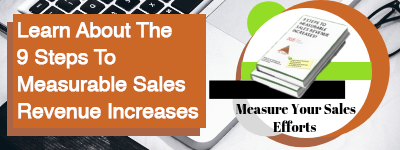B2B Sales Principles = Accurate Forecasting
Over the years of doing both direct selling and managing sales teams, I began to analyze why sales forecasting was so unreliable. Why could we not get to a high degree of accuracy month over month? It occurred to me that we did not have a well defined sales process to help us in our sales forecasting. I asked myself, "so when do I say a deal is going to close?" I realized that it was when I felt it was going to close. And my sales teams acted the same way. I began to examine what was critical to predict when a sales opportunity was going to close with a high degree of accuracy. My research and my evaluation of the activities I was doing helped me come up with a model that can drive a very high degree of predictability.
 1. How the Customer Buys
1. How the Customer Buys
Evaluate how the customer buys from you. How do they look at your type of solution to evaluate alternatives? What is their buying process? How do they handle their budget? Who is involved in evaluating alternatives? Understanding how the customer buys becomes the first step in developing your sales process.2. Determine Sales Stages
Based on your understanding of how the customer buys, you can then develop the definition of the sales stages that follow a sales opportunity from its inception as a lead to the actual close. What is important in defining a sales stage is to define what is the critical buyer decision that you want to occur at each stage. Sales stages reflect both how the buyer moves though the buying process and the seller moves through the selling process. Every CRM system comes predefined with a set of sales stages. Most organizations do not change the stages supplied by the vendor. For the CRM to give you reliable information, you must replace the vendor supplied sales stages with your own defined sales stages.
3. Key Selling Activities.
For each sales stage, one needs to determine the most critical selling activities that must occur at that stage. While at any given point in the selling process there are a lot of activities going on, the goal is to advance the buyer to the next stage. So what are the most critical activities necessary to advance to the next sales/buying stage?
4. Advancement Criteria.
Accurate forecasting comes into play when you have a consistent way of measuring sales opportunity progress. The best way to achieve this is to define, for each sales stage, the key criteria or measurements that must be achieved in order to forecast an opportunity to the next stage. What must sales be able to confirm that has been accomplished in order to move the opportunity to the next stage?
If you optimize your sales process based on these key principles, you'll be on your way to a predictable sales forecast in no time!







Comments